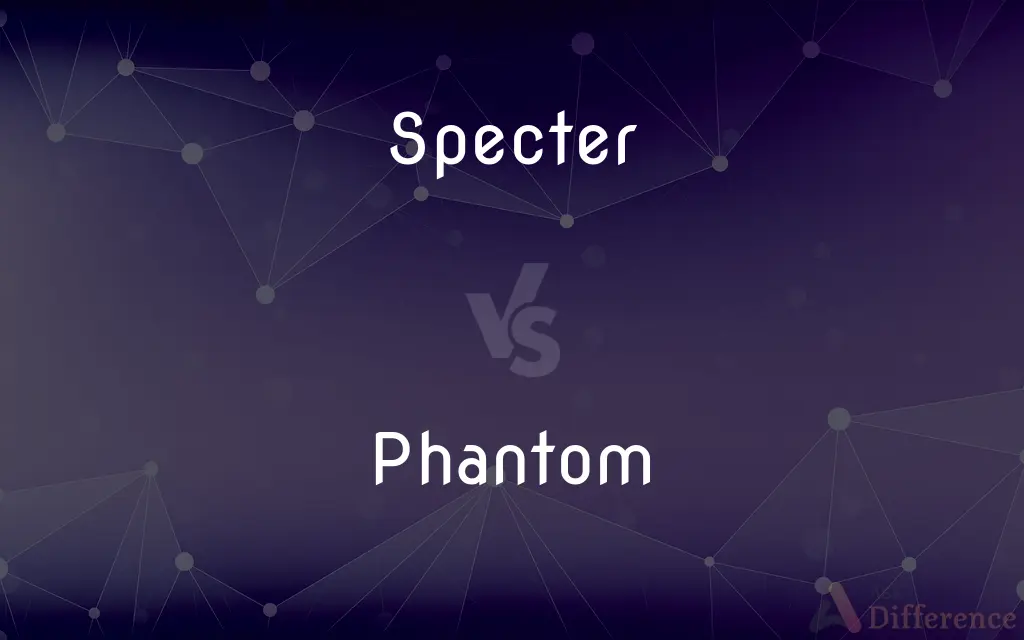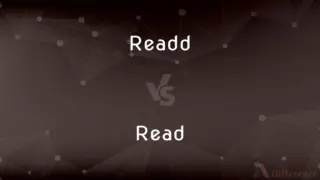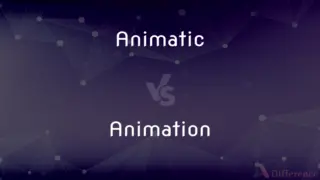Specter vs. Phantom — What's the Difference?
Edited by Tayyaba Rehman — By Fiza Rafique — Updated on April 18, 2024
Specter generally implies a ghostly apparition linked to a specific location or person, suggesting an eerie or haunting presence, while a phantom is a broader term used for illusions or figments of imagination, not necessarily linked to ghostly figures.

Difference Between Specter and Phantom
Table of Contents
ADVERTISEMENT
Key Differences
A specter is typically associated with a specific haunting, often tied to a particular location or an individual's past experiences, evoking a sense of history and often a chilling narrative. In contrast, a phantom can refer to any deceptive appearance or illusion, extending beyond the paranormal to include mirages or figments of one's imagination.
Specters are often depicted in folklore and horror stories as manifestations of unresolved issues or tragedies, giving them a personal and ominous undertone. Whereas phantoms may not carry the same depth of backstory, often serving as generic symbols of fear or the unknown in stories and myths.
In literature and culture, specters are used to symbolize the lingering past that haunts the present, making them potent metaphors for unresolved guilt, secrets, or regrets. On the other hand, phantoms are more versatile in symbolism, representing anything from pure fantasy to abstract fears without a solid tie to past events.
Visual representations of specters usually emphasize their ghostly and ethereal qualities, often showing them as translucent and bound to certain locales or items. Conversely, phantoms can be visualized more variably, ranging from shadowy figures to almost indistinguishable forms, emphasizing their elusive and often non-specific nature.
The emotional response elicited by a specter is usually one of melancholy or dread, linked to the tragic tales or unsettling histories associated with them. Meanwhile, encounters with phantoms can provoke a wider range of emotions, from intrigue to terror, depending on their context as mere illusions or actual supernatural entities.
ADVERTISEMENT
Comparison Chart
Definition
A ghostly apparition linked to a specific location or person.
A ghostly image, often seen as an illusion or figment of the imagination.
Symbolism
Unresolved past, guilt, or tragedy.
Fear, the unknown, or fantasy.
Common Usage in Literature
Manifestations of specific historical or personal hauntings.
Used more broadly for any kind of deceptive appearance or ghostly figure.
Emotional Impact
Typically invokes dread or melancholy.
Can range from intrigue to terror.
Visual Representation
Often depicted as translucent and tied to specific locales.
Visualized more variably, from shadowy figures to nearly invisible forms.
Compare with Definitions
Specter
A visible spirit, especially one of a terrifying nature.
The old mansion is said to be haunted by the specter of its former owner.
Phantom
An apparition or specter, used interchangeably.
The stories of a phantom roaming the castle have scared tourists away.
Specter
An apparition or phantom.
As he wandered the foggy streets, he was startled by a specter that appeared before him.
Phantom
An illusion or a figment of the imagination.
What she saw in the shadows was just a phantom conjured by her fear.
Specter
Figuratively, something that haunts or perturbs the mind.
The specter of past failures haunted him throughout his life.
Phantom
Something apparent to sense but with no substantial existence.
In the desert, travelers are often misled by phantoms created by intense heat.
Specter
Something widely feared as a possible unpleasant or dangerous occurrence.
The specter of nuclear war looms over the world.
Phantom
An image that appears only in the mind.
The phantom pains he experienced after the surgery were very real to him.
Specter
A haunting or disturbing image or prospect.
The specter of poverty and disease is a constant concern in the crisis-ridden region.
Phantom
Something elusive or visionary.
He chased the phantom of wealth and happiness, never quite achieving his dreams.
Specter
A ghostly apparition; a phantom.
Phantom
Something apparently seen, heard, or sensed, but having no physical reality; a ghost or apparition.
Specter
A haunting or disturbing image or prospect
The terrible specter of nuclear war.
Phantom
An image that appears only in the mind; an illusion
Phantoms of a disturbed mind.
Specter
A ghostly apparition, a phantom. 17
A specter haunted the cemetery at the old Vasquez manor.
Phantom
(Medicine) A model of a human body or body part.
Specter
(figuratively) A threatening mental image. 18
Phantom
Resembling, characteristic of, or being a phantom
Tales of a phantom ship haunting the bay.
Specter
(entomology) Any of certain species of dragonfly of the genus Boyeria, family Aeshnidae. 20
Phantom
Fictitious or nonexistent, often when intended to deceive
Phantom employees on the payroll.
Deposits in a phantom bank account.
Specter
Something preternaturally visible; an apparition; a ghost; a phantom.
The ghosts of traitors from the bridge descend,With bold fanatic specters to rejoice.
Phantom
Believed to be real even though illusory
A phantom pregnancy.
Specter
The tarsius.
Phantom
Being a phantom limb
A phantom arm.
Specter
A mental representation of some haunting experience;
He looked like he had seen a ghost
It aroused specters from his past
Phantom
A ghost or apparition.
Specter
A ghostly appearing figure;
We were unprepared for the apparition that confronted us
Phantom
Something apparently seen, heard, or sensed, but having no physical reality; an image that appears only in the mind; an illusion or delusion.
Phantom
(bridge) A placeholder for a pair of players when there are an odd number of pairs playing.
Phantom
(medical imaging) A test object. A test phantom is an object that reproduces the characteristics of human tissue.
Phantom
Illusive.
Phantom
Fictitious or nonexistent.
A phantom limb
Phantom
That which has only an apparent existence; an apparition; a specter; a phantasm; a sprite; an airy spirit; an ideal image.
Strange phantoms rising as the mists arise.
She was a phantom of delight.
Phantom
Being, or of the nature of, a phantom.
Phantom isles are floating in the skies.
Phantom
A ghostly appearing figure;
We were unprepared for the apparition that confronted us
Phantom
Something existing in perception only;
A ghostly apparition at midnight
Phantom
Something apparently sensed but having no physical reality;
Seemed to hear faint phantom bells
The amputee's illusion of a phantom limb
Common Curiosities
Are phantoms always considered supernatural?
Not necessarily; phantoms can also refer to illusions or imaginary visions that have no basis in the supernatural.
How do specters differ from ghosts?
While both are types of apparitions, specters are often specifically tied to particular locales or people, whereas ghosts might not have such specific associations.
What is the primary emotional response associated with specters?
Specters typically evoke feelings of dread or melancholy due to their associations with tragic or haunting past events.
Can phantoms appear in non-paranormal contexts?
Yes, phantoms can also represent illusions or non-existent entities in contexts not related to the supernatural, like mirages.
What type of narrative is common in stories involving specters?
Stories involving specters often feature themes of unresolved issues or past tragedies haunting the present.
Is the term "phantom" used in medical contexts?
Yes, in medical contexts, "phantom pain" refers to pain that feels like it's coming from a body part that's no longer there.
What literary purpose do specters serve?
In literature, specters often symbolize past events or emotions that continue to haunt characters or settings.
How does the emotional impact of a phantom differ from that of a specter?
Phantoms can invoke a broader range of emotions, from curiosity to fear, depending on their nature and context.
Can specters be a metaphor for non-supernatural concepts?
Yes, specters can metaphorically represent any lingering influence or memory that negatively impacts the present.
Do phantoms have to be visually seen?
While often visual, phantoms can also be sensed through other means, such as sounds or smells, especially in literary or horror contexts.
What psychological phenomena could explain the belief in phantoms?
Psychological phenomena such as pareidolia, where the mind responds to a stimulus by perceiving a familiar pattern where none exists, or hypnagogic hallucinations, can explain some beliefs in phantoms.
What can trigger the appearance of a specter in folklore?
In folklore, specters often appear as a result of a curse, an unresolved death, or the violation of a sacred place.
What is a phantom limb?
A phantom limb is the sensation that an amputated or missing limb is still attached to the body and is moving appropriately with other body parts.
Are children more likely to imagine phantoms or specters?
Children might imagine both, but phantoms are more commonly associated with the vivid imaginations of children as they can include any kind of fantastical or unreal creature.
How do cultural interpretations of specters vary?
Cultural interpretations of specters can vary greatly, often reflecting a society's attitudes towards death, the past, and the supernatural.
Share Your Discovery

Previous Comparison
Readd vs. Read
Next Comparison
Animatic vs. AnimationAuthor Spotlight
Written by
Fiza RafiqueFiza Rafique is a skilled content writer at AskDifference.com, where she meticulously refines and enhances written pieces. Drawing from her vast editorial expertise, Fiza ensures clarity, accuracy, and precision in every article. Passionate about language, she continually seeks to elevate the quality of content for readers worldwide.
Edited by
Tayyaba RehmanTayyaba Rehman is a distinguished writer, currently serving as a primary contributor to askdifference.com. As a researcher in semantics and etymology, Tayyaba's passion for the complexity of languages and their distinctions has found a perfect home on the platform. Tayyaba delves into the intricacies of language, distinguishing between commonly confused words and phrases, thereby providing clarity for readers worldwide.














































